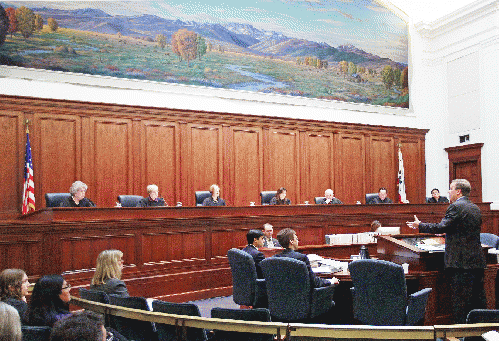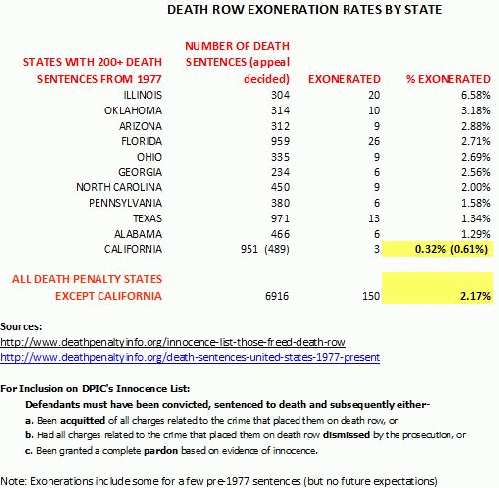In California, only 13 of 951 death sentences have been carried out since 1977. This is a key statistic in the official rationales for two competing death penalty ballot initiatives. Entirely overlooked is the state's 3 in 951 death row exoneration rate. Occasionally, death penalty advocates cite it to show that there are virtually no false capital convictions and that review weeds them out; while anti-death penalty advocates cite it to show that there really are innocents on death row. Neither side recognizes that California's exoneration rate is scandalously low--one seventh the rate in other states. Together with commonsense observations and in-depth analysis, this statistic squelches the California Supreme Court's "careful examination" excuse for extreme delays. Even assuming that an innocent lives long enough for his direct appeal to be heard, he has at most a quarter of the chance of exoneration that he would have elsewhere.
This article presents excerpts from the first part of a two-part paper, California's Death Penalty:People v. Masters v. The California Supreme Court's Carefulness Con, which shows that the CSC's automatic and automatically accepted excuse for extreme delay--that it assures careful examination of the claims raised--is a confidence trick. Despite outspending other states, California in fact takes by far the least care in exonerating its share of innocents.
The first part of the paper (I. The California Supreme Court's Carefulness Con) explains the confidence trick in its legal, political, historic and numerical context, culminating in a terse description of the most urgent case of an obviously credible claim of innocence--that of Kevin Cooper. The Ninth Circuit ultimately let stand Cooper's death sentence by a 16-11 vote, which five of the dissenting judges passionately protested in a voluminous opinion. [1] The Inter-American Commission on Human Rights, which (acting under the Organization of American States' charter) independently but with merely persuasive powers decides claims brought under the American Declaration, recommended that Cooper be reprieved, pending a new investigation. An unorthodox last-ditch clemency plea, seeking precisely such a conditional reprieve, has been before Governor Brown since mid-summer.
The second part of the paper (II. People v. Masters) will be published and reviewed in a couple of weeks. It will particularly demonstrate careless death penalty review by an in-depth presentation of the relatively unknown case of Jarvis Masters. In 1990, Masterswas sentenced to death for the 1985 murder of San Quentin prison guard Sergeant Howell Burchfield. Having a strong innocence claim, Masters wrote to the court, protesting delays. Yet he had to wait 26 years for his appeal to be decided. The grand result, People v. Masters, [2] is pervasively careless. In unanimous laundry list mode, without addressing crucial factual and legal defense contentions, the opinion reproduces the state's version of the facts, perfunctorily discounts numerous claims of basic trial court error, and without discussion ridiculously adds that, even had the trial court made every mistake claimed, the cumulative errors would beyond reasonable doubt have been harmless--i.e. beyond reasonable doubt, no reasonable doubt could have been raised in a reasonable juror's mind.
The Carefulness ConThe imposition of the penalty of death demands the greatest reliability which the law can require. [3] U.S. Supreme Court.
The following short quotations fully express both the CSC's careful examination excuse for extreme delays in reviewing capital cases, and the prevailing acceptance of that conclusory excuse by federal judges:
[A]llowing each case the necessary time, based on its individual facts and circumstances, to permit this court's careful examination of the claims raised is the opposite of a system of random and arbitrary review. [4] "[T]he automatic appeal process following judgments of death is a constitutional safeguard, not a constitutional defect"because it assures careful review of the defendant's conviction and sentence. [5] California Supreme Court.[S]uch delays are the product of a constitutional safeguard, not a constitutional defect, because they assure careful review of the defendant's conviction and sentence. Federal Court of Appeal for the Ninth Circuit. [Citation to CSC.] [6]
As a matter of law, the careful examination excuse misses the point. Under Furman, [7] the delay differences are arbitrary and so cruel and unusual because, in executing less than 2% of the condemned, the selection is driven by factual and procedural incidentals that have nothing to do with the reprehensibility of the crime or the criminal. But in any case, as a matter of fact there is no such careful examination.
Outside of the state and federal judiciaries, no-one disputes that California's death penalty is dysfunctional, and November's ballot includes competing proposals to fix this--Proposition 62 seeks to eliminate the death penalty, Proposition 66 to accelerate it. [8] The extreme delays in California's death penalty review processes are notorious: since 1973, there have been only 13 executions from 951 death sentences, versus 71 deaths from natural causes and 25 from suicide. What is often not recognized is that the delays are not primarily due to dilatory legal tactics, but to the rule that every appeal be heard by the California Supreme Court (CSC)--a rule that the acceleration proposal lets stand. What is never recognized is that, far from assuring careful examination of the claims raised, the extreme delays result in equally extreme failures to exonerate inevitable innocents, of which California has its full share.
Delay may of course allow time for exonerating evidence to surface. However, the main cause of California's capital review delays is certainly not time spent taking additional care. It is time spent waiting for counsel and then for a decision by the CSC. There are now about 350 appeals and 150 habeas corpus petitions pending before the CSC due to the requirement--ironically touted as a superior right--that all death penalty review proceedings be before CSC. [9] The result is unending pressure on the CSC to dispose of death penalty appeals rapidly, when at long last they are heard de novo, without having been trimmed into key legal issues by a regular court of appeal. [10]
For political reasons, there is no prospect of having appeal courts do the job they were designed for, even though directing death penalty appeals straight to the CSC deprives defendants of the two-step review ordinarily due, and even though the result is less speed and less accuracy, due to the impossible and politicized CSC burden. [11]
California's Dishonorable 3-in-951 Exoneration RateThe Death Penalty Information Center (DPIC) publishes an Innocence List containing all death row exonerations since 1973--i.e. post-Furman. An "exoneration" is recognized by the DPIC only if and when (1) all charges related to the crime are dismissed by the prosecution, (2) a retrial or appeal results in acquittal on all charges related to the crime, or (3) a pardon issues because of exculpatory evidence. As of October, 2015, there were 951 California post-Furman death sentences, with no pardons, one full acquittal, and two full dismissals. [12]
Since the 1970s, outside of California 150 of 6,916 death sentences (i.e. 2.17%) have terminated in exonerations. However, the exoneration rate for California is only 0.32% (3 of 951), one seventh of the out-of-state rate. [13] Here are the exoneration rates for all states that handed out more than 200 death sentences from 1977: [14]
The extreme delay in California's death penalty review processes accounts for less than half of this exoneration rate gap. On its face, a mere 3 exonerations in 951 death sentences (with 489 already affirmed on appeal)--would seem to show a virtually meaningless right of review. Because (as follows) the state's capital trials are apparently less accurate than the norm, adopting conservative assumptions of equal trial court accuracy inside and prompt appeals outside California, this means that an innocent on California's death row not only has twice the nationwide chance of dying before his innocence claims are resolved, but, even if he survives to have his first appeal decided, he has at best only a quarter of the chance of exoneration that such an innocent has outside of California. [15]
Even after California's death penalty review processes have been exhausted, 60% of federal habeas corpus petitions have found prejudicial constitutional error due to ineffective counsel, prosecutorial misconduct, judicial mistake, etc. Nationwide, the federal reversal rate, although large, is significantly lower, at 40%. [16] Thus, California's uniquely low exoneration rate correlates with death penalty review processes already adjudged to be exceptionally in accurate.
Next Page 1 | 2 | 3 | 4 | 5 | 6 | 7
(Note: You can view every article as one long page if you sign up as an Advocate Member, or higher).







